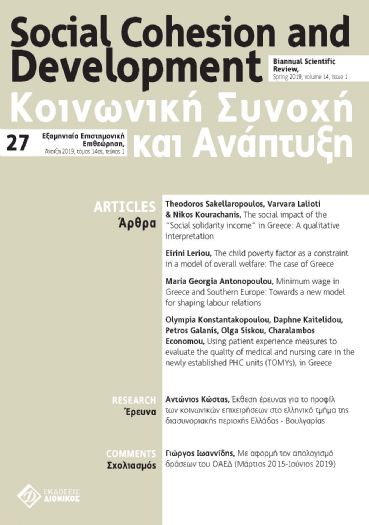The child poverty factor as a constraint in a model of overall welfare: The case of Greece

Published:
Jan 18, 2021
Keywords:
Child poverty welfare index quantitative methods social solidarity crisis Greece human welfare
Abstract
Ιn this paper a specific, specialized and cumulative index is formulated, in a theoretical level, for the measurement of child poverty in Greece. This index is subsequently introduced in a general model of welfare as a constraint and its relation with social solidarity is examined. The creation of an exclusive and polyprismatic child poverty/ welfare index is useful as it helps for a more reliable and exact measurement, in order to take effective policy-measures to address and reduce this phenomenon, which has taken gigantic magnitude in Greece.
Article Details
- How to Cite
-
Leriou, E. (2021). The child poverty factor as a constraint in a model of overall welfare: The case of Greece. Social Cohesion and Development, 14(1), 21–31. https://doi.org/10.12681/scad.25764
- Issue
- Vol. 14 No. 1 (2019)
- Section
- Articles

This work is licensed under a Creative Commons Attribution-NonCommercial-ShareAlike 4.0 International License.
Authors who publish with this journal agree to the following terms:
- Authors retain copyright and grant the journal right of first publication with the work simultaneously licensed under a Creative Commons Attribution Non-Commercial License that allows others to share the work with an acknowledgement of the work's authorship and initial publication in this journal.
- Authors are able to enter into separate, additional contractual arrangements for the non-exclusive distribution of the journal's published version of the work (e.g. post it to an institutional repository or publish it in a book), with an acknowledgement of its initial publication in this journal.
- Authors are permitted and encouraged to post their work online (preferably in institutional repositories or on their website) prior to and during the submission process, as it can lead to productive exchanges, as well as earlier and greater citation of published work (See The Effect of Open Access).
Downloads
Download data is not yet available.
References
Bertelsman St., Eurofound, (2014), “Social cohesion and well-being in the EU”.
Bradshaw, J., (2007a), “An index of child well-being in the European Union”, Social Indicators Research, vol.80:133-177.
Bradshaw, J., (2007b), “Beyond Child Poverty”, Social Policy Research Unit University of York, vol.75:123-128.
Brisson, D. (2012). “Neighborhood Social Cohesion and Food Insecurity: A Longitudinal Study”, Journal of the Society for Social Work and Research, vol.3 (4):268-279.
Corak, M., (2006), “Principles and practicalities for measuring child poverty”, International Social Security Review, vol. 59(2).
De Neubourg, C., Chai, J., De Milliano, M., Plavgo, I., and Wei, Z., (2012), “Cross-Country MODA Study: Multiple Overlapping Deprivation Analysis (MODA) – Technical note”, Working Paper 2012-05, UNICEF Office of Research, Florence.
Dheret, C. (2015). “Fostering Social Cohesion: the missing link in the EU’s exit strategy from the crisis”, Discussion Paper, European Policy Center.
Easterly, W. (2006). “Social Cohesion, Institutions, and Growth”, Center For Global Development, Working Paper No. 94.
Green, A. and Preston, J. (2001). “Education and Social Cohesion: Recentering the Debate”, Peabody Journal of Education, vol. 76 (3/4), Global Issues in Education 2001: 247-284.
Heuser, B., L. ( 2005), “The Ethics of Social Cohesion”, Peabody Journal of Education, Organizations and Social Cohesions, Vol. 80(4):8-15.
Leriou, E. and Tasopoulos, A., “Training an index of child poverty”, Presentation at Poverty’s Causes and Consequences in the Urban Developing World, Poverty and Development Research Center, University of Jyväskylä,, Agora Center, Jyväskylä, Finland 4–6 August 2016.
Lewit, Eugene M., (1993), “Why Is Poverty Increasing among Children”, The Future of Children Health Care Reform, vol.3(2):198-207.
Little M.D.I. (Jun., 1949). “The Foundation of Welfare Economics”, Oxford Economic Papers, New Series, Vol. 1, No.2:227-246.
Mitrakos, Th., (2008), “Child poverty: recent developments and determinants”, Bank of Greece, Economic Bulletin, (30), (In Greek).
Nikolaou, A., (2008), “Dimensions of child poverty in Athens: Theoretical approaches, empirical research and methodological issues, Social and Spatial Transformations in Athens of 21st Century”, Studies - Surveys, National Centre for Social Research, Athens. (in Greek).
Scitovsky, T. (Jun. 1951). “The State of Welfare Economics”, The American Economic Review,
Vol.41, No.3: 303-315.
Seccombe, Karen, (2000), “Families in Poverty in the 1990s: Trends, Causes, Consequences, and Lessons Learned”, Journal of Marriage and Family, vol. 62(4):1094-1113.
Tasopoulos, A., and Leriou, E., (2014). “A New Multidimensional Model of Ethics Educational
on Welfare”, Journal of Neural Parallel and Scientific Computations, vol. 22(4):595-608.
UNICEF, 2012, “The children’s state in Greece”, www.unicef.gr/pdfs/Children in Greece 2012.
pdf. (In Greek).
UNICEF, 2013, “Child Well-being in Rich Countries: A comparative overview”, Innocenti Report
Card 11, UNICEF Office of Research, Florence.
Vavouras, I. and Syrmeli, M., E. (2015), “The Greek Debt Crisis under the Spectrum of
Institutional Analysis: The Role of Governance and Social Development”, Working Paper,
Athens: Scientific Society for Social Cohesion and Development.
Wen-Hao, Chen, and Corak, M., (2008), “Child Poverty and Changes in Child Poverty”,
Demography, vol. 45(3):537-553


